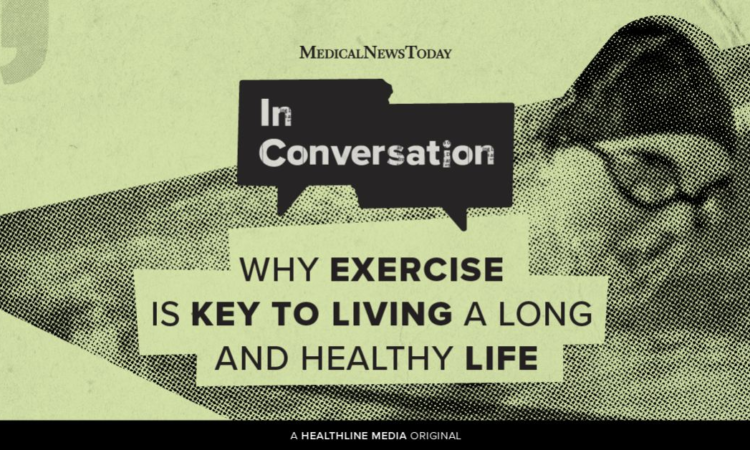
What should we do in order to live healthier lives for longer? Research shows there are a few lifestyle interventions that can effectively prolong our life and health span. One of these is exercise, but what kind, and in what combinations, and why does it help add years to our lives? Find out in our latest podcast episode.
Seemingly since times immemorial, humankind has been, metaphorically speaking, seeking the path that leads to the “Fountain of Youth” — that is ways to ensure a longer, healthier life.
And while we may not yet benefit of any “miracle” medicines or technologies to prolong our life spans well over the hundred-year mark, many recent studies have provided strong evidence in support of the notion that simple, achievable lifestyle changes can help us stay healthy for longer and decrease our risk of premature death.
Research presented at the
These habits are related to diet, maintaining a healthy weight, avoiding tobacco, maintaining good sleep hygiene, managing cholesterol, blood sugar, and blood pressure, and, no less importantly, staying physically active.
In the latest instalment of our In Conversation podcast, Medical News Today explores the link between exercise and living a long and healthy life, in dialogue with Dr. Borja del Pozo Cruz and Dr. Edwina (Eddie) Brocklesby.
Dr. del Pozo Cruz is principal researcher in Applied Health Sciences at the University of Cadiz in Spain, and adjunct associate professor in the Department of Sports Science and Clinical Biomechanics at the University of Southern Denmark.
In collaboration with other researchers, Dr. del Pozo Cruz has conducted various studies exploring the link between different forms of exercise and the risk of death from different causes.
Dr. Brocklesby has gained fame under the nickname “Iron Gran,” as at the age of 72, she was the oldest British woman to complete an Ironman Triathlon. She is also founder and CEO of Silverfit, a not-for-profit organization promoting lifelong fitness.
In a study published in
The study looked at the effect of moderate aerobic physical activity, such as walking or gentle cycling, vigorous aerobic physical activity, such as running, and muscle-strengthening activity, like weight lifting.
Its findings indicated that a balanced combination of all of these forms of exercise worked best for reducing mortality risk.
More specifically, around 75 minutes of moderate aerobic exercise, plus more than 150 minutes of vigorous exercise, alongside at least a couple of strength training sessions per week were associated with a lower risk of all-cause mortality.
When it came to reducing the risk of death linked to cardiovascular disease specifically, Dr. del Pozo Cruz and his collaborators suggested combining a minimum of 150–225 minutes of moderate physical activity with around 75 minutes of vigorous exercise, and two or more strength training sessions per week.
Dr. Brocklesby, who goes by “Eddie,” is herself an example of the importance of combining different forms of exercise. Indeed, training and participating in a triathlon — which is an endurance multisport race where participants compete in swimming, cycling, and running — involves achieving a balanced “diet” of moderate and vigorous exercise, as well as strength training.
But what about people who are not nearly as athletic? What is the minimum “amount” of exercise that could help fend off some of the conditions that pose the highest threat to health?
Dr. del Pozo Cruz and his team may also have found an answer to this question. In December 2022, they published the findings to a previous study in the European Heart Journal.
This research suggested that engaging in vigorous exercise for only 2 minutes a day could help slash the risk of death related to cancer or cardiovascular events.
The researchers found that study participants who never engaged in vigorous exercise had a 4% risk of dying within 5 years, but introducing less than 10 minutes of vigorous activity weekly halved this risk. Moreover, their risk of death halved again for those who engaged in at least 60 minutes of exercise per week.
In our podcast, Dr. del Pozo Cruz emphasized that almost any amount of any form of exercise is better than none, a point reinforced by a new study arguing that any activity at all is better for heart health than a sedentary lifestyle.
However, he also cautioned that physical activity related to chores or to one’s job, as opposed to exercise in a leisure context, may sometimes do more harm than good.
Once again, his idea is supported by recently published research, which found a link between physically demanding occupations and a higher risk of cognitive impairment.
Some of the most common occupations linked to intensive physical activity cited in this research were in nursing and care, retail, and farming, where individuals are on their feet a lot, and often having to deal with stressful situations.
So while all forms of exercise can be good for health, strenuous or intensive physical activity in a work environment could end up compounding the risk of various health conditions.
And even exercise for leisure can affect aspects of physical health — such as joint integrity — particularly later in life. In our podcast, both Dr. del Pozo Cruz and Eddie emphasized the importance of consulting a trusted healthcare provider, who can advise on the best forms of exercise to engage in on an individual basis.
To find out more about how and why different forms of exercise can support longevity, and to hear the story of how Edwina became “Iron Gran,” listen to our podcast episode in full below or on your preferred streaming platform.
Share this article
OUR BRANDS







